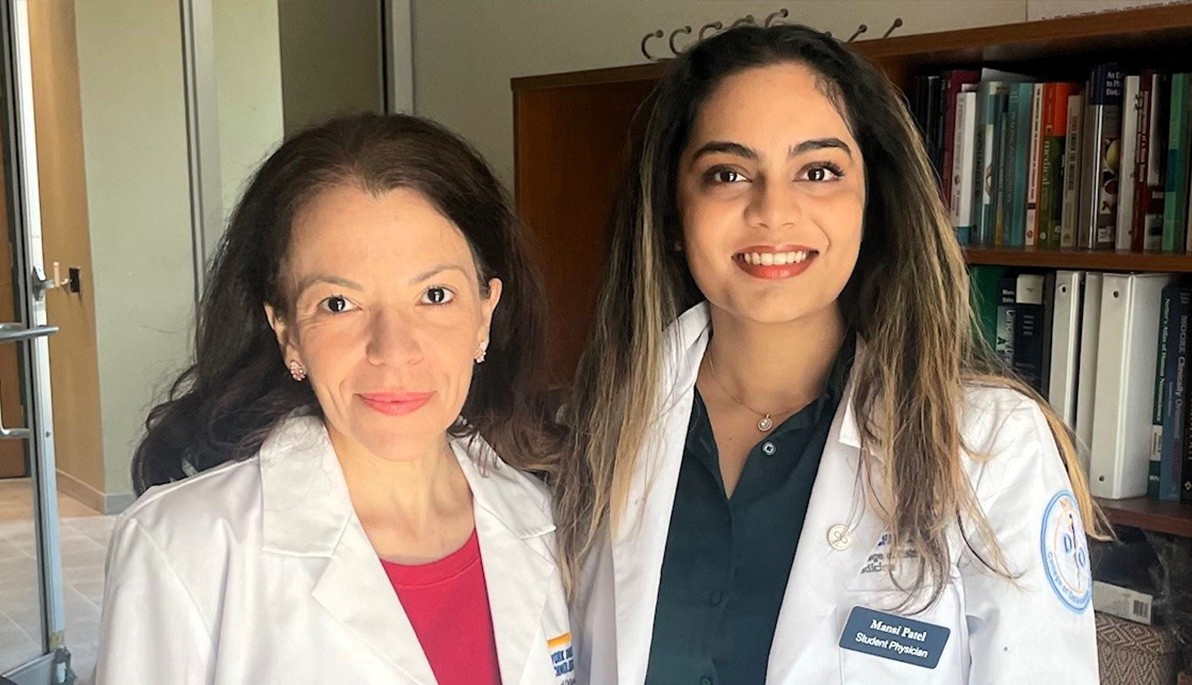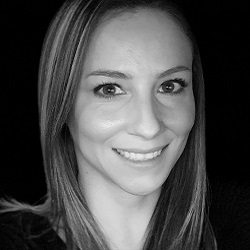News
Research Aims To Improve Understanding of RSV Vaccines
March 5, 2024
Pictured from left: Associate Professor Maria Pino and NYITCOM student Mansi Patel's research sheds light on RSV vaccine considerations for special populations, including older and pregnant patients.
Efforts to vaccinate vulnerable populations against respiratory syncytial virus (RSV) faced an uphill battle this season. However, a new study by researchers at the College of Osteopathic Medicine (NYITCOM) could help combat RSV vaccine misinformation and quell vaccine hesitancy.
In December 2022, following two difficult COVID-19 winters, healthcare facilities across the United States reported a hospital bed shortage due to a surge of RSV cases. Then, ahead of the current 2023-2024 season, for the first time, the Food and Drug Administration (FDA) approved RSV vaccines for use in adults. Surprisingly, few eligible patients received one.
Vaccination efforts faced another challenge in January when the Centers for Disease Control and Prevention (CDC) issued an emergency report, which cited that 128 pregnant patients were given the wrong RSV vaccine and some children, for which no RSV vaccine yet exists, received shots.
Now, a research paper by NYITCOM student Mansi Patel and Associate Professor of Clinical Specialties Maria Pino, Ph.D., could help set the record straight. The study, which published on February 2 in the journal Pharmacy Times, sheds light on RSV vaccine considerations for special populations, including older and pregnant patients.
“It was important to publish an article on the available RSV vaccines because it allows healthcare professionals to be better educated on who needs to get immunized,” says Patel. “Our article also elaborates on the possible side effects that may be caused by the RSV vaccine. This allows healthcare professionals to consider who may be more prone to experiencing these adverse effects before recommending the inoculation to a patient.”
The researchers note that two vaccines have been made available for RSV vaccination in adults: Abrysvo (manufactured by Pfizer) and Arexvy (manufactured by GSK), with vaccination recommended for older adults, patients with weakened immune systems, individuals living in long-term facilities, and those with underlying cardiopulmonary disease. The study reports that up to 160,000 RSV hospitalizations and 10,000 deaths occur annually in adults ages 65 and over.
Surprisingly, despite these figures and increased concerns about respiratory illness in recent years, reports showed that just over one in five older Americans received an RSV vaccine this season. In addition, although one of the two available vaccines was approved for use in later-stage pregnancies, only 16 percent of eligible pregnant patients were vaccinated.
Pino, a licensed New York State pharmacist certified to administer immunizations, believes the data could indicate a growing public sentiment about “vaccine overload.” As she explains, adults are now encouraged to receive the influenza vaccine and COVID-19 vaccine each year, as those virus strains are constantly evolving, and adding another recommended annual vaccine may have caused some patients to become hesitant.
“While the RSV vaccine is lifesaving to special populations, as we note in our study, many individuals are still concerned about vaccine overload,” she says. “They often ask, ‘What are the long-term adverse effects of these vaccines? Should I receive them all on the same day?’ They also know at least one person who got the virus after receiving the vaccination. But patients should trust the advice of their healthcare professional when deciding to vaccinate.”
Pino and Patel’s study also shares timely information regarding which vaccine pregnant patients can receive. They note that while both Abrysvo and Arexvy can be considered for older individuals, only Abrysvo has been approved by the FDA for use during pregnancy, as it underwent clinical trials in pregnant individuals.
Many experts believe that the reason some pregnant patients received the incorrect vaccine is that both shots—despite having different manufacturers—have similar names, both beginning with the letter “A.” Given this, Pino calls for pharmacists and other vaccine providers to take precautions.
“I would encourage those involved in vaccination administration to have safety protocols in place—store each formulation in different refrigerators with signs that clearly state ‘not for pregnant patients.’ Another practice that I have used is to ‘show the bottle’ and repeat to the patient what you will be injecting them with before you insert the needle into their arm,” Pino advises.
When properly administered to patients in their third trimester, the approved vaccine could allow protective antibodies to be passed on to unborn babies and prevent severe RSV disease in infants from birth to six months of age. As the researchers cite, in clinical studies, maternal RSV vaccine uptake reduced the risk of severe disease in infants by 82 percent within three months and 69 percent within six months following birth.
Through her involvement in the study, Patel shares that she has become more aware of the dangers that RSV poses to newborns and elderly patients. She is certain that she, as well as her future patients, will benefit from her research participation.
“Research experiences like this allow medical students to stay updated on current medical innovations. Being properly educated on healthcare situations, like RSV vaccines, helps future physicians become better prepared to take care of their patients,” Patel says.



_Thumb.jpg)

